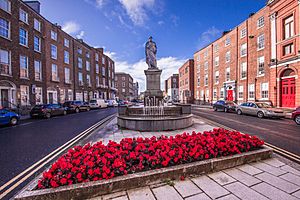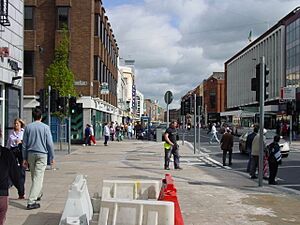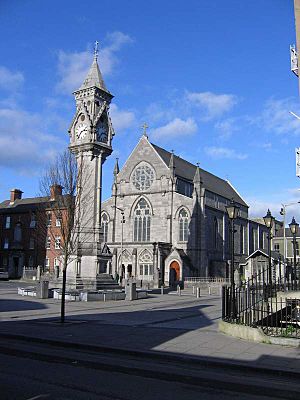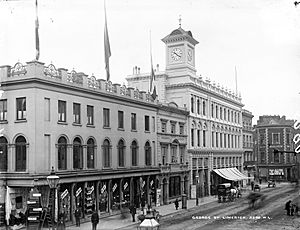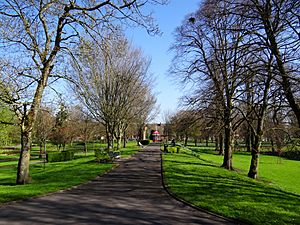Newtown Pery, Limerick facts for kids
Newtown Pery is a special part of central Limerick, Ireland. It's the main city centre, or where most of the important businesses are. This area is famous for its amazing Georgian buildings. It has the biggest collection of Georgian houses in Ireland, apart from Dublin. In 1837, a writer named Samuel Lewis said Newtown Pery was "one of the handsomest towns in Ireland."
Contents
How Newtown Pery Started
Before Newtown Pery was built, the city of Limerick was further north. It had two main parts: Englishtown and Irishtown. Englishtown was on an island and settled by people from England. Irishtown was on the riverbank and settled by local Irish people. These old towns had narrow, winding streets and strong walls.
In the 18th century, Limerick started to grow and become very successful. It became a major port city on the west side of Ireland. This was because of the River Shannon and new canals, which made trade with Britain and America much easier. This brought a lot of money to the city.
The creation of Newtown Pery was thanks to Edmund Sexton Pery. He owned land south of the old city. In 1769, he asked an engineer named Christopher Colles to design a new town on his land. Colles created a plan for streets laid out in a grid pattern. This means the streets cross each other at right angles, like a checkerboard.
Builders then bought land from Pery and built tall, elegant Georgian houses. The main street was O'Connell Street, which was first called George's Street. Some of the first houses were built by the Arthur family. You can see some of the best Georgian buildings at The Crescent and Pery Square. The Customs House, now the Hunt Museum, is another beautiful Georgian building.
By the early 1800s, Newtown Pery was the most popular and fashionable part of Limerick. To help it grow, a new bridge was built in 1835. It connected Newtown Pery directly to the west side of the River Shannon. This bridge was first called Wellesley Bridge and later renamed Sarsfield Bridge. It helped make Newtown Pery the most important area in Limerick.
What Makes Newtown Pery Special?
Newtown Pery has always been Limerick's main business area. It's also where you'll find most of the shops, especially on O'Connell Street and William Street.
One cool thing about Newtown Pery is its grid plan street layout. The streets run straight north-south and east-west. This is similar to how cities like New York City and Philadelphia are designed. This makes Limerick's Georgian buildings look very neat and uniform. This is because Edmund Pery owned all the land, so he could make sure the whole area was built with one clear plan.
Limerick kept growing into the 19th century, but Pery's full plan for the city was never finished. The idea was to build even more to the south. However, a terrible economic downturn in Ireland, caused by the Great Irish Famine, stopped the building. The houses at Pery Square were some of the last big Georgian buildings constructed.
Unlike Dublin, Newtown Pery was built on completely new land. Limerick's old medieval city was left untouched. Most of the medieval buildings are gone now, but the old street names like Nicholas Street and Mary Street still exist. In Dublin, many old medieval parts were rebuilt to make way for Georgian buildings.
Changes Over Time
Even though Newtown Pery has many important Georgian buildings and is Limerick's city centre, it slowly lost its status as the most fashionable area. Its Georgian look was also changed, especially around the shops on O'Connell Street and William Street.
Limerick faced tough economic times in the 20th century. Some of the grand townhouses were turned into small, crowded apartments. Not much money was invested in Newtown Pery. Many families and businesses moved to new areas outside the city. Some old townhouses were even lost completely.
New buildings from the 1960s replaced some of the beautiful old ones. For example, Cannock's Department Store and the Royal George Hotel were rebuilt. This changed the look of the city centre. However, many of the Georgian townhouses are still standing. Despite these changes, Newtown Pery remained the main shopping and services area for Limerick.
In the late 20th century, Ireland's economy improved, a period known as the Celtic Tiger. But Newtown Pery didn't get as much investment as other areas. Big new shopping centres were built in the suburbs, like the Crescent Shopping Centre. This meant fewer people came to shop on O'Connell Street.
However, in recent years, people have realized how important Newtown Pery is. Now, big improvements are happening to make the area better. The City and County Council and the Government are working together to bring life back to the city centre. Many buildings are now used by offices, schools, and restaurants. O'Connell Street itself had a major upgrade from 2021 to 2023.
What's Next for Newtown Pery?
To help Newtown Pery and Limerick's city centre grow, the Limerick City and County Council and the Government have started new plans. These plans aim to bring people and businesses back to the city.
One big plan is the €250 million Limerick 2030 project. This will completely redevelop the Arthur's Quay area into a new shopping complex. The University of Limerick also bought an old department store building and turned it into an educational space.
Another plan is the Living City Initiative. This helps people get tax breaks if they fix up Georgian houses in certain areas. It also helps shop owners upgrade their stores. Newtown Pery is a reminder of Limerick's rich history and remains one of the most important parts of Ireland's Georgian Era.
Famous Places in Newtown Pery
Here are some of the well-known buildings and landmarks in Newtown Pery:
- Customs House, now the Hunt Museum
- Old City Hall
- Augustinian Church
- The Crescent, a curved Georgian development
- Sacred Heart Church
- O'Connell Monument
- Dominican Church
- Tait Monument
- People's Park
- The People's Museum of Limerick
- Limerick City Gallery of Art
- Belltable Arts Centre
- Limerick War Memorial (Cenotaph)
- Colbert Station
- Frank McCourt Museum & Leamy Art Gallery
- St. Michael's Church of Ireland
- Sarsfield Bridge
- Shannon Rowing Club Clubhouse
- Riverpoint building
- Clayton Hotel
 | Aurelia Browder |
 | Nannie Helen Burroughs |
 | Michelle Alexander |


